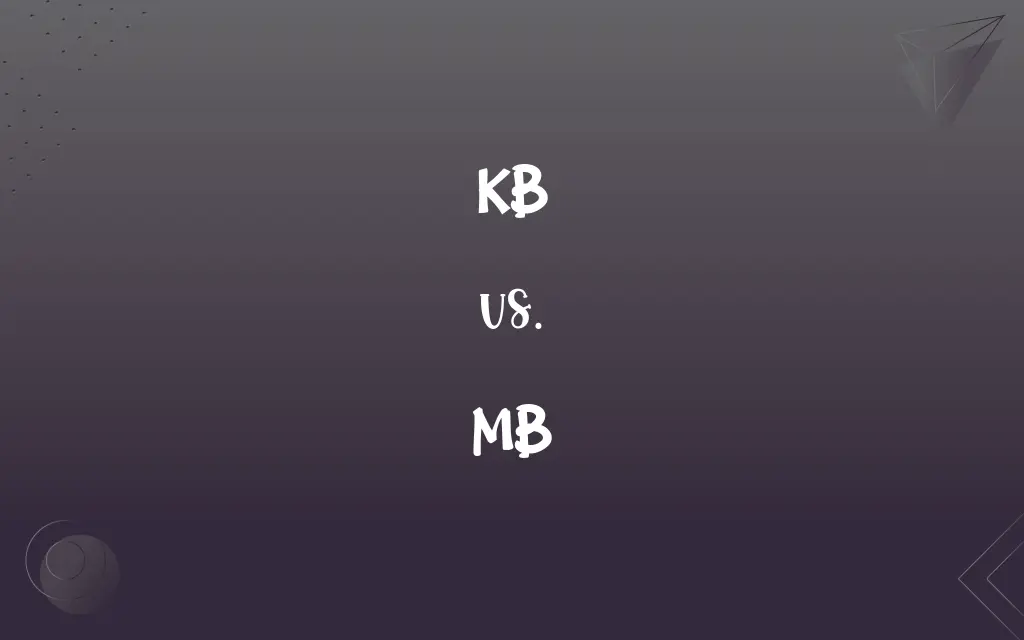KB vs. MB: What's the Difference?
Edited by Aimie Carlson || By Harlon Moss || Published on January 27, 2024
KB (Kilobyte) typically represents 1,024 bytes, while MB (Megabyte) represents 1,024 kilobytes. They are units of digital information storage.

Key Differences
A Kilobyte (KB) is a unit of digital information storage that is traditionally equal to 1,024 bytes. In contrast, a Megabyte (MB) is a larger unit, consisting of approximately 1,024 kilobytes. Both KB and MB are commonly used to measure file sizes and data transfer rates in computers and digital devices.
In terms of scale, 1 MB is equivalent to 1,024 KB, illustrating the larger capacity of a megabyte. When discussing storage capacities, such as the size of a document or a photo, KBs are often used for smaller files, whereas MBs are used for larger files like videos or large software applications.
The usage of KB and MB can vary depending on context. For example, in terms of data usage, internet plans often count usage in megabytes or gigabytes, whereas file sizes for text documents are usually in kilobytes. This highlights the scale difference between the two units.
When transferring data, the speed is often measured in KB or MB per second. For instance, a faster internet connection might be described in megabytes per second (MBps), while a slower data transfer could be in kilobytes per second (KBps).
KB and MB are both essential units for measuring digital data, but they are different in scale. KB is suitable for smaller files and data sizes, while MB is used for larger files and higher data capacities.
ADVERTISEMENT
Comparison Chart
Size
1,024 bytes
1,024 kilobytes (or 1,048,576 bytes)
Usage
Smaller files, e.g., text documents
Larger files, e.g., images, videos
Data Transfer
Slower speeds, e.g., KBps
Faster speeds, e.g., MBps
Storage Capacity
Suitable for minimal data storage
Suitable for substantial data storage
Common Applications
Email attachments, small images
Software files, multimedia files
ADVERTISEMENT
KB and MB Definitions
KB
KB stands for Kilobyte, a unit of digital data.
The document is only 30 KB in size.
MB
In digital storage, 1 MB equals 1,024 KB.
My presentation is approximately 3 MB in size.
KB
KB is used to measure the size of small files.
This image is saved as a 100 KB JPEG file.
MB
MB is common for describing internet data plans.
My monthly data plan allows for 5 GB, or 5,120 MB, of data usage.
KB
In computing, 1 KB is 1,024 bytes.
The text file requires about 2 KB of space.
MB
MB stands for Megabyte, a larger unit of digital data.
The video file is 20 MB.
KB
KB is a common unit in data storage.
The email attachment was only 45 KB.
MB
MB is used to measure the size of larger files.
The software installation requires 500 MB of space.
KB
KB is often used for web traffic and data usage.
The webpage uses about 150 KB of data.
MB
MB is a standard measure for data capacity.
The smartphone has 64 GB, or 65,536 MB, of storage.
KB
(genetics) kilobase
MB
A unit of information equal to one million (1,048,576) bytes
KB
(computing) keyboard
MB
(a British degree) a bachelor's degree in medicine
KB
A unit of information equal to one thousand (1024) bytes
FAQs
What does KB stand for?
KB stands for Kilobyte, a unit of digital information.
Is MB used for large files?
Yes, MB is typically used to describe the size of larger files, like images or videos.
How many KB are in one MB?
One MB consists of approximately 1,024 KB.
Can you convert MB to KB?
Yes, by multiplying the number of MB by 1,024, you get the size in KB.
Is KB used in internet data plans?
Typically, internet data plans are measured in MB or GB, not KB.
Is it possible to have a file smaller than 1 KB?
Yes, files can be smaller than 1 KB, measured in bytes.
How many bytes are in one KB?
One KB is typically equal to 1,024 bytes.
What is the use of KB in computing?
KB is used to measure file sizes and data transfer rates, especially for smaller files.
Is KB larger than a byte?
Yes, 1 KB is larger than 1 byte, as it contains 1,024 bytes.
What does MB stand for?
MB stands for Megabyte, a larger unit of digital information.
What is more common for storage capacity: MB or KB?
MB is more common for indicating larger storage capacities.
Are KB and MB used in smartphone storage?
Yes, but smartphones typically have storage in the GB range.
Is there a visual difference in files sized in KB vs. MB?
Larger files, like high-resolution images, are usually in MB and have more detail.
Are KB and MB the same in all types of computers?
Yes, the definitions of KB and MB are standard across different computer systems.
How do KB and MB relate to GB?
1 GB (Gigabyte) is equal to 1,024 MB, and 1 MB is equal to 1,024 KB.
Are MB and KB the same?
No, MB is a larger unit than KB, used for larger data sizes.
Do all files measured in KB load faster than those in MB?
Generally, yes, because files in KB are smaller and require less data transfer.
What's a typical file size in KB?
A simple text document or a small image might be measured in KB.
How is data speed related to KB and MB?
Data transfer speeds can be measured in KBps (Kilobytes per second) or MBps (Megabytes per second).
Can KB and MB be used interchangeably?
No, they represent different scales of data size and should be used appropriately.
About Author
Written by
Harlon MossHarlon is a seasoned quality moderator and accomplished content writer for Difference Wiki. An alumnus of the prestigious University of California, he earned his degree in Computer Science. Leveraging his academic background, Harlon brings a meticulous and informed perspective to his work, ensuring content accuracy and excellence.
Edited by
Aimie CarlsonAimie Carlson, holding a master's degree in English literature, is a fervent English language enthusiast. She lends her writing talents to Difference Wiki, a prominent website that specializes in comparisons, offering readers insightful analyses that both captivate and inform.






































































